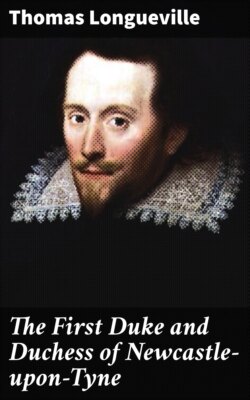Читать книгу The First Duke and Duchess of Newcastle-upon-Tyne - Thomas Longueville - Страница 7
На сайте Литреса книга снята с продажи.
“William Viscount Mansfield to the Duke of Buckingham.
ОглавлениеTable of Contents
“May it please your Grace,
“To give you an account of your Commandes to me in treatinge with my Lo: of Newarke.
I protest to God I did use as much diligence and care posibly I could to bringe him on.”
The business, apparently, was a proposed sale of land. Cavendish had just begun to be hopeful of making his bargain, when Lord Newark suddenly protested:—
“That he had made sollem vowe which was nott to be broken that he would never sell that lande or part with itt any waye, and that he had made another vowe before the Docter bought his Lande, that he would never bye ... though I sett before him the goodness of the bargin and what a small value that was to advance himself to that Honor, and how mutch he should serve and please so Hoble a friend as your Grace was to him, not forgettinge of the contrary side to laye sum dangers before him.”
Cavendish might well point out that there would be “sum dangers” in opposing the will of Buckingham;[12] but, as it happened, a couple of months later Buckingham was assassinated.
[12] Cavendish’s son, Henry, married a grand-daughter of Lord Newark. Lord Newark lost his life through Cavendish’s brother, Sir Charles Cavendish. The Parliamentarians had captured Lord Newark—then Earl of Kingston—and were taking him in a boat to Hull. Sir Charles pursued them and demanded that they should stop and release the Earl. On their refusing, Sir Charles ordered his men to fire, when they unfortunately killed Kingston and his servant. They afterwards captured the boat and slew all its crew. Kingston had strongly disapproved of the King’s despotic measures; but could not bring himself to join the Parliamentary party against the sovereign to whom he owed all his honours: therefore he decided to be neutral. When urged to join the Roundhead army, he replied: “When I take arms with the King against the Parliament, or with the Parliament against the King, let a cannon bullet divide me between them”. On the occasion described above, when the men in Sir Charles Cavendish’s boat opened fire upon that in which Kingston was a prisoner, Kingston hurried on deck “to show himself, and to prevail with them to forbear shooting; but as soon as he appeared, a cannon bullet flew from the King’s army, and divided him in the middle, being then in the Parliament’s pinnace, who perished according to his own unhappy imprecation” (quoted in Burke’s Anecdotes of the Aristocracy, vol. I, pp. 208-9; authority not named).
Newcastle, as we must now call William Cavendish, had a rent-roll of more than £22,000 a year—a very large income at the then value of gold—besides more than £3000 a year from his wife. Even with this wealth, he found his visits to the Court very expensive and by degrees even embarrassing, as will be seen presently.
Of Newcastle’s private correspondence at the period which we have lately been considering, there is a good deal among the manuscripts at Welbeck.[13] Only a few specimens shall be given.
[13] Historical Manuscripts Commission, 13th Report, Appendix, Part II, p. 120 seq.
